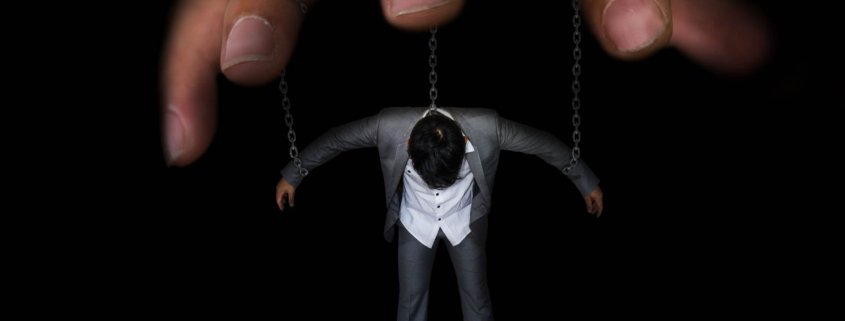The Invisible Chains – Control in Relationships
And Why You Might Not See It

Control in Relationships
Most people think control in relationships looks like screaming, throwing things, or someone literally forbidding you from seeing friends. But that’s the obvious stuff. The kind that makes for dramatic movies and clear-cut abuse stories.
The control that destroys most relationships is quieter. Subtler. It wears a mask of concern, logic, or even love. And both the controller and the controlled often miss it entirely.
The controller’s playbook
Control rarely announces itself. It doesn’t walk in saying “I’m going to manipulate you now.” Instead, it shows up wearing different costumes, each one designed to look like something else entirely.
The Rational Controller never raises their voice. They use logic like a weapon, making you feel stupid for having emotions. When you express hurt, they tell you you’re being irrational, illogical, or overly sensitive. They position themselves as the reasonable one while you become the dramatic, emotional mess. When they express anger, it’s cold and calculated – a sharp tone, or look of disapproval that cuts through any attempt at emotional discussion. After a while, you start questioning your own reality.
The Concerned Controller wraps domination in care. They’ll say “I’m just worried about you,” as they question your friends, your choices, your judgment. They track your spending because they’re “helping with finances.” They need to know where you are because they “care about your safety.” Love becomes surveillance. Their anger shows up as hurt disappointment when you resist their help.
The Victim Controller turns every conversation about your needs into a story about their pain. Try to set a boundary, and suddenly you’re attacking them. Ask for something different, and you’re being selfish. They’re always the wounded party, which makes you the perpetrator. You end up consoling them for your own hurt. Their anger is wounded rage – how could you be so cruel to someone who’s already suffering?
The Silent Controller withdraws affection, attention, or communication when things don’t go their way. No yelling required. Just cold silence that makes you scramble to figure out what you did wrong. You start questioning everything you say or do, walking on eggshells, becoming smaller and smaller to avoid the emotional frost that follows any misstep. This is anger that destroys you slowly, quietly, completely.
Why people miss it
You’d think anyone would spot control immediately. But most of us end up in controlling relationships because we’re trying to make sense of behaviours that don’t make logical sense.
We miss control because it doesn’t match our mental image. We think we’d never tolerate abuse, so when it shows up wearing the mask of concern or logic, we don’t recognize it. We dismiss it as normal relationship conflict because it doesn’t add up with our mental image of what abuse looks like.
What makes it even more confusing is that controlling people often have genuinely wonderful qualities. They might be brilliant, funny, successful, generous with friends, great with kids, or incredibly charming in social situations. They’re not monsters. They’re complex humans with both light and shadow, which makes the controlling behaviour feel like an anomaly rather than a pattern.
They’re just reacting from their own terror and wounds, genuinely believing their behaviour is justified.
When both people are unconscious of the pattern, it can go on for years.
Why they need control
People who have a need control in relationships are usually running from their own deep fear of abandonment, loss, or feeling powerless. This often stems from insecure attachment – patterns formed early in life when love felt unpredictable or conditional. Somewhere in their history, chaos reigned. Maybe they grew up in an unpredictable home where love was conditional. Maybe they experienced a devastating loss that left them feeling helpless. Maybe they learned early that the only way to feel safe was to manage every variable.
So they try to control their partners the way you might try to control a dangerous situation. If they can monitor your behavior, predict your responses, and shape your choices, they can avoid the crushing anxiety of uncertainty. The unpredictability that comes from their partner’s autonomy feels like a threat to them.
The tragedy is that this strategy destroys the very thing it’s trying to protect. The more they control, the more you disappear. The more you disappear, the less real the relationship becomes. They end up with someone who accommodates their every need but is no longer authentically themselves. They get compliance, but lose connection.
When you start to see it
The damage happens so gradually you don’t notice until it’s done. But once you start paying attention, the signs become impossible to ignore.
You feel lighter when they’re away on a business trip. Your shoulders drop. You sleep better. You order what you actually want for dinner. You laugh louder with friends. You realise you’ve been holding your breath for months.
Notice when your stomach clenches as their key turns in the door. Notice how you rehearse conversations before having them, always trying to find the right words that won’t set them off. Notice how you’ve stopped mentioning certain friends, certain interests, certain parts of yourself.
Your mood shifts when they’re around – not because you’re happy to see them, but because you’re bracing for impact. You become vigilant, reading their face for signs of what kind of day it’s going to be.
Notice when you start telling yourself the same things they always tell you. When something hurts, you think you’re being too sensitive. When you feel upset, you think you’re overreacting. When you try to express a need, you believe you’re being selfish.
Their voice has become your inner critic.
The confident person you used to be feels like someone you knew a long time ago.
This is your wake-up call. The erosion stops when you start seeing it clearly, without the explanations, justifications, or hope that it will magically change.
The price of staying vs. the price of leaving
Staying in a controlling relationship has a cost that compounds over time. It’s not just your current happiness at stake – it’s your future capacity for authentic love, your ability to trust your own judgment, your willingness to take up space in the world.
But leaving has costs too. Controllers don’t let go easily. There might be financial consequences, social fallout, custody battles, or simply the terror of starting over. The pain of leaving is immediate and sharp. The pain of staying is chronic and numbing.
Only you can decide which price you’re willing to pay. But make that decision with your eyes wide open, knowing exactly what each choice will cost you in the long run.
What real love actually looks like
After control, real love can feel alien. It’s quieter. Less dramatic. There’s no need to earn it or prove you deserve it. It doesn’t come with conditions or fine print.
Real love celebrates your independence rather than threatening it. It trusts your judgment even when it disagrees. It can handle your no without punishment or withdrawal. It doesn’t need to monitor, manage, or modify you to feel secure.
Real love feels peaceful. It enhances who you are rather than requiring you to become someone else. And sometimes, after control, that peace feels so foreign you almost miss the chaos.
But you don’t have to choose between drama and love. Between performing and being. Between walking on eggshells and standing on solid ground.
You get to choose between control and freedom.
The choice is always yours. But first, you have to see it clearly.







